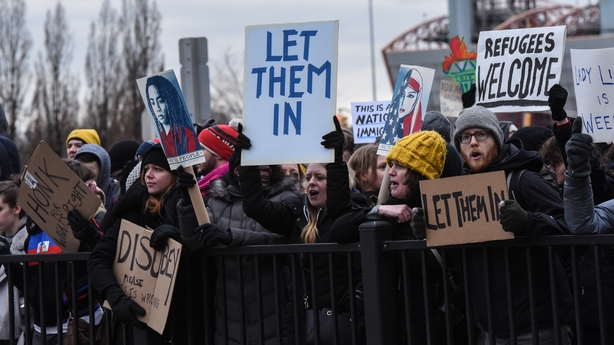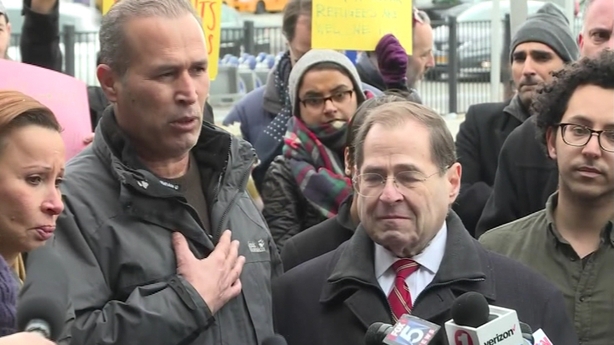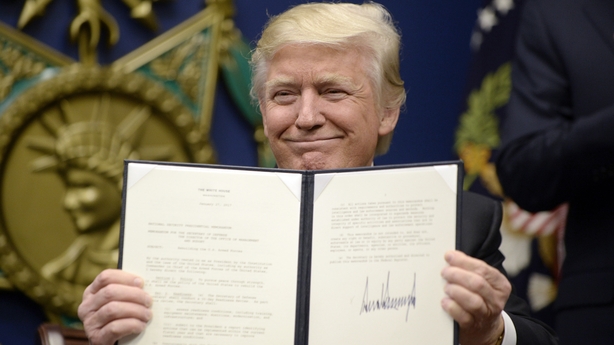US President Donald Trump has said that his "very strict" crackdown on Muslim immigration was working "very nicely," amid mounting resistance to the order branded as blatantly discriminatory.
In an executive order signed yesterday, Mr Trump halted the arrival of refugees for at least 120 days and imposed tough new controls on travellers from Iran, Iraq, Libya, Somalia, Syria and Yemen for the next three months.
"It's working out very nicely. You see it at the airports, you see it all over," Mr Trump told reporters, after travellers from those countries were stopped from boarding US-bound planes, triggering angry protests at airports.

The US President said: "We're going to have a very, very strict ban and we're going to have extreme vetting which we should have had in this country for many years."
His comments come after two Iraqis with ties to US security forces filed a lawsuit against Mr Trump after they were detained at New York’s JFK Airport hours after the executive order was signed by the president.
In a lawsuit filed in federal court in Brooklyn, New York, the men are challenging the directive on constitutional grounds.
The suit says that their connections to the American forces made them targets in their home country and the pair had valid visas to enter the United States.
The lawsuit highlights some of the legal obstacles facing the new administration as it tries to carry out the directive.
One of the men, Hameed Khalid Darweesh, was released today and told a crowd of reporters outside John F Kennedy International Airport that he did not have ill feelings about his detention.
"America is the greatest nation, the greatest people in the world," he said.

Mr Darweesh, 53, worked for the US Army and for a US contractor in Iraq from 2003 to 2013 as an interpreter and engineer, the lawsuit said.
The second plaintiff, Haider Sameer Abdulkhaleq Alshawi, 33,was still being held. He is the husband of an Iraqi woman who worked for a US contractor in Iraq, and she already lives in Houston, the suit said.
Ten other travellers not named in the suit were being detained at JFK Airport this afternoon, a New York Democrat told reporters.
Mr Trump said yesterday that the order would help protect Americans from terrorist attacks.
He said: "We only want to admit those into our country who will support our country and love deeply our people."
Meanwhile, Iran has said that it would stop US citizens entering the country in retaliation to Washington's visa ban.
A Foreign Ministry statement said: "While respecting the American people and distinguishing between them and the hostile policies of the US government, Iran will implement the principle of reciprocity until the offensive US limitations against Iranian nationals are lifted.
"The restrictions against travel by Muslims to America ... are an open affront against the Muslim world and the Iranian nation in particular and will be known as a great gift to extremists," said the statement, carried by state media.
The US ban will make it virtually impossible for relatives and friends of an estimated one million Iranian-Americans to visit the United States.
UN agencies urge Trump to allow refugees entry
Earlier the United Nations refugee agency and International Organization for Migration called on the Trump administration to continue offering asylum to people fleeing war and persecution, saying its resettlement programme was vital.
"The needs of refugees and migrants worldwide have never been greater and the US resettlement program is one of the most important in the world," the two Geneva-based agencies said in a joint statement.

IOM and UNHCR said they remained committed to working with the US administration towards a shared goal of ensuring "safe and secure resettlement and immigration programmes".
"We strongly believe that refugees should receive equal treatment for protection and assistance, and opportunities for resettlement, regardless of their religion, nationality or race," they said.
Move 'aimed at helping Christians in Syria'
The UN agencies hoped "that the US will continue its strong leadership role and long tradition of protecting those who are fleeing conflict and persecution".
Some 25,000 refugees were resettled in the United States between October and year-end under UNHCR's programme for the most vulnerable, the agency said.
A host of US federal government agencies are involved and extensive background checks are carried out, UNHCR spokeswoman Vannina Maestracci told a briefing.
Mr Trump's order seeks to prioritise refugees fleeing religious persecution, a move he separately said was aimed at helping Christians in Syria. That led some legal experts to question whether the order was constitutional.
One group said it would announce a court challenge on Monday. The Council on American-Islamic Relations said the order targets Muslims because of their faith, contravening the US Constitutional right to freedom of religion.
"President Trump has cloaked what is a discriminatory ban against nationals of Muslim countries under the banner of national security," said Greg Chen of the American Immigration Lawyers Association.
The bans, though temporary, took effect immediately, causing havoc and confusion for would-be travellers with passports from Iran, Iraq, Libya, Somalia, Sudan, Syria and Yemen.
Mr Trump has long pledged to take this kind of action, making it a prominent feature of his campaign for the 8 November election, but people who work with Muslim immigrants and refugees were scrambling to determine the scope of the order.
Division over constitutionality of order
Legal experts were divided on whether this order would be constitutional.
Mr Trump's order had been expected to include a directive about setting up "safe zones" for Syrian refugees inside the country, but no such language was included yesterday.
The order may also affect special refugee programs for Iraqis who worked for the US government as translators after the 2003 invasion of Iraq.
Democrats were quick to condemn Mr Trump's order as un-American, saying it would tarnish the reputation of the United States as a land that welcomes immigrants.
"Today's executive order from President Trump is more about extreme xenophobia than extreme vetting," said Democratic Senator Edward Markey in a statement.
Republican Speaker Paul Ryan, who had panned Mr Trump's original campaign pledge to ban Muslims from entering the United States, expressed some support yesterday.
"We are a compassionate nation, and I support the refugee resettlement program, but it's time to reevaluate and strengthen the visa vetting process," Mr Ryan said.
"President Trump is right to make sure we are doing everything possible to know exactly who is entering our country," Mr Ryan said.
I will be America's greatest defender and most loyal champion. -DJT pic.twitter.com/wukJ6YqvLu
— President Trump (@POTUS) January 28, 2017
Qatar Airways, Etihad to enforce Trump travel ban
Qatar Airways and Etihad Airways have said they would enforce the new rules governing entry to the US following Mr Trump's temporary order.
A spokesperson for Qatar Airways said it would only carry passengers to the US who had the correct documentation.
An official from the airline said: "We are enforcing the new rules. If travellers to the US don't have the proper documentation, we are not going to take them to the US."
Abu Dhabi-based Etihad Airways said it will apply restrictions on its US routes "effective immediately".
Citizens of the affected countries will need to have a valid US permanent residency card, known as the "Green Card" or a diplomatic visa to travel, an Etihad spokesperson said in a statement.
Qatar Airways has also posted a "travel alert" online, listing the paperwork required by citizens of the seven countries affected by the order.
These included the "Green Card" and government and diplomatic visas.

